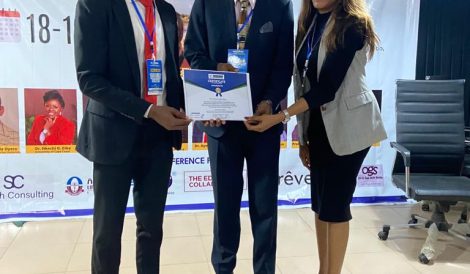Prof. Evans Osabuohien
- Posted on
- No Comments
Introduction
Sub-Saharan Africa economies are strategic to the global economy, especially because of their population, accounting for over 1 billion persons (African Development Bank, 2023) out of which half of this population will be under 25 years by the year 2050 (The World Bank, 2023). Apart from human population, it is estimated that about 30 percent of the world’s natural resources reserves are domiciled in SSA (United Nations Environment Programme, 2023). However, the SSA region contributes only 2.03% of the global GDP in the year 2022 (World Development Indicators, 2023). While economies in SSA are largely importers of finished goods from China, the USA, Europe, and Japan, commodity products are the main exports from the region. The focus on commodity exports places economies in SSA at a susceptible position to global economic shocks, such as the global financial crisis of 2017, the pandemic outbreak of 2019, and the present Russia-Ukraine crisis.
Meanwhile, economic growth and development are symbolic of the capacity of nations and the firms that operate across countries to be more production- and export-oriented than consumption- and import reliant (Liu & Dunford, 2016). It may hold that oversight of this simple understanding of the production economy serves as a significant determinant for the overreliance of SSA economies to remain underperforming despite their vast wealth of natural and human resources.
Indeed, economies of Sub-Saharan Africa (SSA) need to be repositioned from its present state of heavy reliance on consumption to becoming a production-oriented economy. The realities surrounding the economic activities in the region assert to the need for a reinforcement of SSA’s industrial and service sectors for the accomplishment of product and export orientation (Beecroft, Osabuohien, Efobi, Olurinola, & Osabohien, 2020). Economic growth and development are accomplished by the ability of countries and the firms operating in them to be productive and export-oriented (Sen & Te Velde, 2009). However, SSA countries with its under-explored and vast richness in natural and human resources only remains at a potential growth and development level (Ibidunni, Okorie, Kehinde, Obinda, & Abiodun, 2023).
While the theorization of resource utilization of in SSA has received a large volume of research attention (Lemessa, Gabbiye, & Alemayehu, 2023; Owusu, 2021), we argue that there is an existing gap in the existing literature about the infusion of the roles of firms-social organs-the state for the economic transformation of SSA economies from a consumption to a production position. It is noticeable that shreds of literature exists that discusses the functionality of these earlier mentioned economic agents as transformers of basic input resources across various SSA economies (Ibidunni, Ufua, Okorie, & Kehinde, 2019; Oloyede, Osabuohien, & Ejemeyovwi, 2021).
Furthermore, the existing literature have broadly covered these range of topics from respective views that cover either the government, society or firm levels (Debroux, 2010). However, until now, there is lacking an assemblage of intellectual discourses that projects their collective roles, especially from a stakeholder’s perspective and incorporating diverse firm-level and institutional-level theories to explain the transformation of SSA into a production economy. Specifically, we posit that a complimentary logic of the institutional theory (North, 1991), social network theory (Wilson, 1975), and the stakeholders theory (Freeman, 1984) are critical to underpinning the interactions among the firms, societal, and governance structures that will transform SSA Countries into productive economies. The scope of discussions in the present study extends the existing works by integrating firms and national institutions operating within a socially and economically bound context into a production structure that accounts for the utilization of available resources for the economic good of countries.
From the foregoing, this book contributes to the existing literature on economic transformation by unravelling a collection of a wide array of topics and theoretical positions that discuss a multidisciplinary perspective on the transformation of SSA’s economies to production and export orientation. The book equally contributes to advancing economic growth (SDG 8), industry collaborations and innovations in SSA (SDG 9), and partnerships between SSA and the global economy (SDG 17). This book will benefit researchers, academics, policymakers, entrepreneurs in large firms and, inform SMEs, and students interested in understanding their collective roles in advancing Africa’s economic aspirations both at a regional and a cross-regional level.
Thematic Areas
We solicit theoretical, empirical or case-based papers that offer new insights on the book project. We are particularly interested in researchers/academics with an interest to contributing on the following thematic areas that constitute the scope of this book project:
Theme One: Network Capabilities and Foreign Knowledge Domestication: The topics in this thematic area will cover informal SMEs industry networks that support cross-border, inter-firm knowledge exchange and how such relationship is relevant to outputs. It will be beneficial to investigate how inter-firm networks form capabilities for production capacity; the multiplicity of factors that influence large firm relationships with informal SMEs’ production capabilities and other dimensions of output; the topics relating to a broader industry network capability will be beneficial to this project; among others.
Theme Two: Boosting Labour Productivity for SSA’s Regional Prosperity: SSA with an approximated population of 1.18 billion persons and a fast growing youth and adolescent’s population translates to a need to increase labour engagement. Therefore, topics in this thematic area should focus on identifying most productive sectors to direct labour engagement; employee-employer relations that enhance labour productivity; human capital development for regional productivity; managing human resources for improved productivity; and so much more.
Theme Three: Inter-regional relations and the Productive Capability of SSA : The recently launched African Continental Free Trade Area (AfCFTA) forms a critical mass of discourse for the influence of inter-regional trade relations and the production capacity of firms in SSA. The scope of works in this thematic area will also discuss how large firm production and industrialisation will influence SMEs dissemination of finished products and their influence on the regional value chain; and so much more.
Theme Four: Global Supply Chain and Informal Economy in SSA: Having established that many SMEs in SSA’s informal economy carryon business through importation from their large firm counterpart spread across the globe, it becomes imperative to extensively understand the dynamics of the global supply chain on the production capability of large and small firms in SSA; topics should also cover (but not limited to) the synergistic the opportunities that are open to informal SMEs in advancing SSA’s industrialisation and the global value chain (GVC).
Theme Five: SSA’s Institutional landscape and the Regional Productive Economy: Topics in theme five should broadly explore the roles of economic governance that result from institutions, and fiscal and monetary measures as critical areas of coverage to the regional production economy; and so much more.
Theme Six: Informal Sector and Economic Transformation in SSA: The informal sector in SSA is strategic to the economic outlook of the regional economy. Informality accounts for about 60 percent of businesses in SSA. Thus, the challenges associated with unemployment and opportunity exploitation are largely cushioned by participants in the informal economy. Besides, the role of the informal sector in driving many innovations happening in the large firms in SSA cannot be over emphasised. Submissions in this thematic area will focus on the association of informal sector and large firms in the economic transformation of SSA. Paper should address the informal to formal transition in novel ways that suggests actionable policies; the intermediary roles of civil societies and economic groups as policy advocates will also be an interesting area to discuss. Broadly, papers in this theme should explain the role of informal sector players and their various stakeholders base in the economic transformation of SSA economies.
Submission Guidelines
The editors, welcome original articles including quantitative and qualitative studies, case studies and critical reviews, dealing with sub-themes from a multidisciplinary analytical/theoretical framework.
We strongly recommend that authors should clearly align their chapter with at least one of the Sustainable Development Goals (SDG). Chapters should be submitted by sending same to the guest editors’ using the email addresses.
Thereafter, submitted chapters will undergo a double-blind review process. After the review processes, all collections will be submitted to Palgrave for publication. There is NO Submission Fee nor Publication Fee. Authors of Accepted Chapters would sign authors agreement that would be provided by the publisher (Palgrave Macmillan).
Important Dates
Authors should take note of the following crucial dates:
- 27th of October 2023 – Abstract submission (200 – 250 words)
- 26th of January 2024 – Chapter submission (5,000 – 8,000 words)
- 29th of March 2024 – Author Notification of Review Results
- 28th of June 2024 – Proposed Date for Book Publication
PLEASE, SUBMIT CHAPTER PROPOSAL VIA THIS ONLINE FORM
Direct inquiries to the Guest Editors:
Ibidunni Ayodotun Stephen: [email protected]
Evans Osabuohien: [email protected]; [email protected]
Brief Information on the Editors
Dr. Ayodotun Stephen Ibidunni (http://orcid.org/0000-0001-5790-3508)
Dr. Ibidunni is a Senior Lecturer and Head of the Business Administration Department at Chrisland University, Nigeria. His research interests are Strategic Management, Operations Management, and Entrepreneurship in developing economies. He is a recipient of many local and international awards. His works have appeared in reputable journals including African Journal of Economics and Management Studies, Journal of African Business, Managerial and Decision Economics, Journal of Workplace Learning, and Higher Education, Skills and Work-based Learning, among others.
Professor Evans Osabuohien (https://orcid.org/0000-0002-3258-8326 )
Evans Osabuohien is a Professor of Economics at Covenant University and the Founding Chair of DePECOS Institutions and Development Research (DIaDeRC), Nigeria. He is the author of five books and over 200 scholarly articles. He has consulted on many projects for international agencies such as ACBF, AERC, CODESRIA, IFPRI, J-PAL Africa, UNCTAD, among others. He is a member of many International Learned Societies/Professional Associations. He is the Pioneer Chair of the Centre for Economic Policy and Development Research (CEPDeR) and Regional Centre of Expertise, Ogun State (RCE Ogun). He is a fellow of the Alexander von Humboldt Foundation (since 2012) and Swedish Institute (since 2009), among many others. He is also a visiting professor at universities within and outside Africa.
References
African Development Bank (2023). Human Development. (31st August 2023).
Beecroft, I., Osabuohien, E. S., Efobi, U. R., Olurinola, I., & Osabohien, R. A. (2020). Manufacturing export and ICT infrastructure in West Africa: Investigating the roles of economic and political institutions. Institutions and Economies, 1-36.
Debroux, P. (2010). ‘2 – The rising tide of entrepreneurship’, in Debroux, P. (eds), Chandos Asian Studies Series, Female Entrepreneurship in East and South-East Asia, Chandos Publishing, 2010, Pages 21-45.
Freeman, R. E. (1984). Strategic management: A stakeholder approach. Boston, Pitman Publishing Inc.
Ibidunni, A. S., Okorie, U. E., Kehinde, B., Obinda, G., & Abiodun, J. A. (2023). Productivity in Sub Sahara Africa’s Agricultural Sector: An Application of Data Envelopment Analysis and Regression Analysis. Operations Research Forum, 4(36).
Ibidunni, A. S., Ufua, D., E. Okorie, U. E. and Kehinde, B. E. (2019). Labour Productivity in Agricultural Sector of Sub Sahara Africa (2010 – 2017): A Data Envelopment and Panel Regression Approach. African Journal of Economics and Management Studies, 11(2), 207-232.
Lemessa, G., Gabbiye, N., & Alemayehu, E. (2023). Waste to resource: Utilization of waste bagasse as an alternative adsorbent to remove heavy metals from wastewaters in sub-Saharan Africa: A review. Water Practice and Technology, 18(2), 393-407.
Liu, W., & Dunford, M. (2016). Inclusive globalization: Unpacking China’s belt and road initiative. Area Development and Policy, 1(3), 323-340.
North, D. C. (1991). Institutions. Journal of economic perspectives, 5(1), 97-112.
Oloyede, B. M., Osabuohien, E. S., & Ejemeyovwi, J. O. (2021). Trade openness and economic growth in Africa’s regional economic communities: empirical evidence from ECOWAS and SADC. Heliyon, 7(5).
Owusu, S. (2021). Powering structural transformation and productivity gains in Africa: The role of global value chains and resource endowments. Maastricht Economic and Social Research Institute on Innovation and Technology (UNU-MERIT).
Sen, K., & Te Velde, D. W. (2009). State business relations and economic growth in Sub-Saharan Africa. Journal of Development Studies, 45(8), 1267-1283.
United Nations Environment Programme (2023). Our work in Africa. (31st August 2023).
Wilson, E. O. (1975). Sociobiology: the new synthesis. Harvard Univ. Press, Cambridge, MA
World Development Indicators (2023) Gross Domestic Products 2022.




